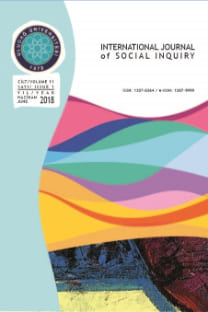Globalisation, Imperialism, and Non-Governmental Organisations: An Illustration With the Country Programme Belarus-Ukraine-Moldova of Civic Education Project
Globalisation, Imperialism, and Non-Governmental Organisations: An Illustration With the Country Programme Belarus-Ukraine-Moldova of Civic Education Project
Non-Governmental Organizations, Globalisation, Imperialism Belarus-Ukraine-Moldova (BUM) of Civic Education Project (CEP),
___
- Brewer, A. (1980) Marxist theories of imperialism: A critical survey, London: Routledge and Kegan Paul.
- Bruff, I. (2005) ‘Making Sense of the Globalisation Debate when Engaging in Political Economy Analysis’ British Journal of Politics and International Relations 7: 261-80.
- Civic Education Project (1997) Education for the Transition: Part I. International Co- operation in Social Science Higher Education in Central and Europe, Conference Report.
- Civic Education Project (1997) Education for the Transition: Part II. Social Science Teaching at Central and East European Universities, A Needs Assessment.
- Civic Education Project (1997) Education for the Transition: Part III. Higher Education Policy in Central and Eastern Europe, Country Reports.
- Clarke, G. (1998) ‘Non-governmental organization (NGOs) and politics in the developing world’ Political Studies XLVI: 36-52.
- Edwards, M. and Hulme, D (1996) ‘Too close for comfort? The impact of official aid on nongovernmental organizations’ World Development 24(6): 961-973.
- Evans, P. (2000) ‘Fighting Marginalization with Transnational Networks: Counter Hegemonic Globalization’ Contemporary Sociology 29(1): 230-241.
- Fisher, J. (1998) Non governments: NGOs and the political development of the Third World, West Hartford, Conn.: Kumarian Press.
- Fulcher, J. (2000) ‘Globalisation, the nation-state and global society’ Sociological Review 48(4):522-43.
- Gudynas, E. (1997). ‘NGOs facing democracy and globalization: The challenges of Latin America’ Transnational Associations, 49(4): 199-204.
- Hamm, B. and Smandych, R. (eds) (2005) Cultural Imperialism: Essays on the Political Economy of Cultural Domination, Ontario: Broadview Press.
- Hardt, M and Negri, A. (2000) Empire, Cambridge, Mass.: Harvard University Press.
- Harvey, D. (2003) The New Imperialism, Oxford: Oxford University Press.
- Hilhorst, D. (2003) The Real World of NGOs: Discourses, Diversity and Development, London: Zed Books.
- Hobsbawm, E. (1994) Age of Extremes: The Short Twentieth Century, London: Michael Joseph.
- Kotkin, S. (2001) Kotkin Report: Independent Evaluation of Civic Education Project, commissioned by Higher Education Support Program (confidential internal document).
- Lenin, V. (1964) ‘Imperialism: the highest stage of capitalism’ in Collected Works, 22: 304, Moscow: Progress Publishers.
- Lindberg, S. and Sverrisson, A. (eds) (1997) Social Movements in Development: The Challenge of Globalization and Democratization, London: Macmillan.
- Mabee, B. (2004) ‘Discourse of empire: the US “empire”, globalisation and international relations’ Third World Quarterly 25(8): 1359-78.
- Mattausch, J. (2003) ‘Chance and societal change’ Sociological Review 51(4): 506-27.
- Mehmet, O. (1999) Westernizing the Third World: The eurocentricity of economic development theories, London and New York: Routledge.
- Mercer, C. (2002) ‘NGOs, civil society and democratization: a critical review of the literature’ Progress in Development Studies 2(1): 5-22.
- Negri, A. (2005) (translated by Matteo Mandarini) Time for Revolution, Reprinted Edition, London and New York: Continuum.
- Owen, R. and Sutcliffe, B. (eds) (1972) Studies in the theory of imperialism, London: Longman.
- Passvant, P. and Dean, J. (eds) (2004) Empire’s New Clothes: Reading Hardt and Negri, New York and London: Routledge.
- Pearce, J. (1997) ‘Civil society, the market and democracy in Latin America’ Democratisation 4(2): 57-83.
- Petras, J. (1997) ‘Imperialism and NGOs in Latin America’ Monthly Review 49(7): 10
- Pieterse, J.N. (2004) Globalization or Empire? New York and London: Routledge.
- Prasch, R. (2005) ‘Neoliberalism and Empire: How Are They Related?’ Review of Radical Political Economics, 37 (3): 281-7.
- Putzel, J. (2005) ‘Globalization, Liberalization, and Prospects for the State’ International Political Science Review 26(1):5-16.
- Robertson, R. (1992) Globalization: Social Theory and Global Culture, London: Sage.
- Rossi, U. (2005) ‘The Counter-Empire to Come or the Discourse of the Great Rival: An Attempted Decoding of Michael Hardt’s and Toni Negri’s Empire’ Science and Society 69(2): 191-217.
- Ruccio, D. (2003) ‘Globalization and Imperialism’ Rethinking Marxism 15(1): 75-94.
- Stiglitz, J. (2002) Globalization and its Discontents, London: Allen Lane.
- Szymanski, A. (1981) The Logic of Imperialism, New York: Praeger.
- Toye, J. (1993) Dilemmas of development: reflections on the counter-revolution in development economics, Second Edition, Oxford: Blackwell.
- Urry, J. (2000) Sociology beyond societies: mobilities for the twentieth-first century, London and New York: Routledge.
- Wallerstein, I. (1974, 1980, 1988) The Modern World-System, Three Volumes, New York and San Diego: Academic Press.
- ISSN: 1307-8364
- Yayın Aralığı: 3
- Başlangıç: 2008
- Yayıncı: BURSA ULUDAĞ ÜNİVERSİTESİ > SOSYAL BİLİMLER ENSTİTÜSÜ
Jennifer A. REISIG, Monica K. MILLER
Gendered Justice: Tragedy and the Revision of the Feminine
Global Response to Terrorism: Alliance of Civilizations
Naim KAPUCU, Vener GARAYEV, Tolga ARSLAN
Globalisation and War: The Historical and Current Controversy on Humanitarian Interventions
